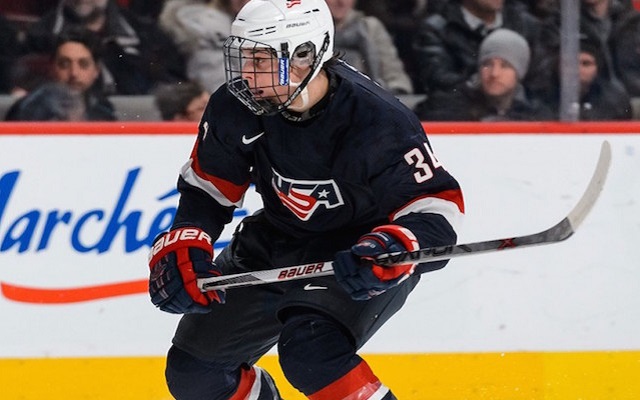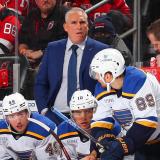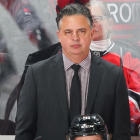
Auston Matthews, the projected No. 1 prospect for the 2016 NHL Entry Draft, has decided to spend his draft-eligible season as a professional. After missing the 2015 draft age cut-off by two days, Matthews will play next season with the ZSC Lions in Zurich, Switzerland.
The team announced Matthews’ expected arrival on Twitter Friday.
Guess who's coming to Zurich? #greatnews @A_Matthews34 pic.twitter.com/xdDwnq3Ii4
— ZSC Lions (@zsclions) August 7, 2015
According to ZSC's news release, Matthews has a one-year contract and had his residence permit authorized under a bilateral agreement between the United States and Switzerland. His residence permit will not take effect until after his 18th birthday which is Sept. 17, per the conditions of its authorization.
This is essentially an unprecedented move for a North American-born and trained prospect to spend his draft-eligible season in Europe. It’s usually the other way around, in fact. However, Matthews is no ordinary prospect.
A native of Scottsdale, Ariz., yes ARIZONA, Matthews spent the last two seasons at USA Hockey’s National Team Development Program in Ann Arbor, Mich. Last season, as a member of the U.S. National Under-18 Team, Matthews laid waste to the record books at the vaunted program, many of which were previously held by Patrick Kane or Phil Kessel.
Matthews posted 55 goals and notched 117 points in 60 games to set records in both categories. He starred at the recent World Under-18 World Championship as well, which coincidentally took place in Switzerland. Matthews had 15 points in seven games as he led Team USA to the gold medal.
Here are three key things to know about Matthews and this unique move.
1. Why does it matter?
Anytime someone does something different, it’s news. That’s particularly true of the hockey development pyramid. For North American players, it’s been very simple. You either play Canadian major junior or you play college hockey. That’s your path to the NHL. Players have two really good options.
Matthews is breaking down a wall and showing that there’s actually another option. Having come from a non-traditional hockey market, and admittedly didn’t even realize how good he was until he made the U.S. NTDP, he’s exploring an option most players probably didn’t even realize they had.
So why would he do something like this? First off, Matthews would have had to accelerate his schooling to attend a U.S. college hockey program. That means a summer spent in school with no guarantees of getting through the NCAA clearinghouse. He also had the option of going to the Western Hockey League where the Everett Silvertips hold his rights. However, Matthews has essentially played two years of junior hockey while at the NTDP. A third, perhaps, wouldn't have done him much good developmentally (more on that below).
Matthews is a very special case. Don’t expect this to become a trend, because Hockey Canada and USA Hockey would have to grant transfers to allow players to play overseas and they won’t do it for just anybody who asks. Given Matthews’ age, physical maturity and overall skill set, he needed a bigger challenge than what major junior could offer and he wasn’t going to be able to go to a college program next season. This weirdly makes perfect sense. Which brings us to point No. 2.
2. What are the benefits?
For Matthews, the benefits of going to Switzerland are many.
First and foremost, this is a development decision. Matthews comes in at 6-foot-2, 210 pounds. He could have been drafted this year if he was born two days earlier and probably would have been one of the top-three picks, with some suggesting he could’ve given Jack Eichel a run for his money at No. 2.
Having already spent two years playing U20 hockey while in Ann Arbor, he’s played against his peers long enough to know he's on a different level. Sure, juniors was good enough for Connor McDavid, but anyone that saw McDavid knew that he was just toying with the age level.
By going to Switzerland, Matthews will be playing against not only grown men, but seasoned professionals. Even if the Swiss pro league is not the highest-level, it is very good hockey that should challenge Matthews enough.
Another big-time factor is the game schedule in Switzerland. It is kind of like a hybrid between NCAA and WHL seasons, where it's more games than college and fewer than major junior. He’ll play around 50-plus games in the regular season with a lighter travel schedule. That will allow more time for practices, off-ice training and lifting to continue getting bigger and stronger.
On top of all that, Matthews will be coached by former NHL coach and Stanley Cup champion Marc Crawford. So he’s got someone that understands the league and what Matthews is going to need to get to the next level.
Lastly, he gets paid a real salary. That wouldn’t be the case in college hockey and he’d only get a weekly stipend in the WHL. Since everyone expects Matthews to be in the NHL by 2016-17, and the fact that he missed this year’s draft by only two days, there’s no reason for him not to have a shot at making a nice chunk of change.
3. What will this do to his draft stock?
This is a big question, for sure. Matthews is going away from the eyeballs of the largest number of scouts. He’s going away from the limelight that shined so brightly on Connor McDavid and Jack Eichel last season. None of that matters if he performs.
Matthews is a well-known commodity. He played for Team USA at the World Juniors last year, was one of the best players at the most recent U18 World Championship featuring many players selected highly in last year’s draft. He also will be known as the kid that took down all of Patrick Kane’s records at the NTDP. Additionally, he will still be available for Team USA at the World Juniors this year, which will have multiple representatives from all 30 NHL teams in attendance.
As long as he meets expectations this year, which are admittedly exceptionally high, he’s going to be the No. 1 pick in 2016 and he'll have done it by paving a path truly his own.





















